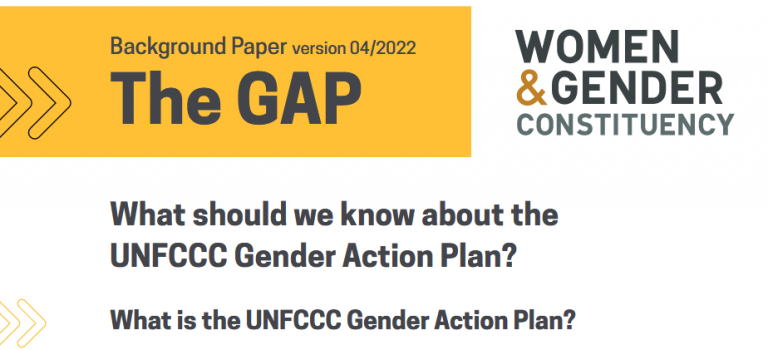What should you know about the UNFCCC Gender Action Plan and the upcoming review?

What should you know about the UNFCCC Gender Action Plan and the upcoming review?

When is the intermediate review of the Gender Action Plan happening?
At SBI56 during the UNFCCC intersessional negotiations taking place in Bonn, 06-16 June, an intermediate review of the progress of implementation of the Gender Action Plan (GAP) activities will be conducted. The review will draw on the report prepared by the UNFCCC Secretariat based on the submissions delivered earlier this year. The Women and Gender Constituency has prepared a submission which can be accessed here.
In addition, this year just transition will be one focus topic of the GAP implementation. The International Labour Organization (ILO) has prepared a report that will be published soon here.
During SBI56 informal consultations will take place based on the review which focusses on:
- Reflections on the progress of implementation of the activities contained within the gender action plan
- Information on the multidimensional impacts of the coronavirus disease
- Reflections on areas for improvement
- Reflections on further work to be undertaken
On May 25th the UNFCCC Secretariat Gender team has shared information on what can be expected on gender at SB56 including a recording that can be watched here.
For those who are not yet fully familiar with the Gender Action Plan, the Women and Gender Constituency has prepared a background paper that should help feminists, women’s and gender justice organizations, researchers, media and civil society in understanding and implementing the GAP.
What is the GAP?
The UNFCCC adopted the enhanced Lima Work Programme on Gender (LWPG) and Gender Action Plan (GAP) in December 2019. The enhanced LWPG is a decision made by the Parties of the UNFCCC, and the GAP is contained in the annex. This GAP is enhanced because it builds upon the LWPG first adopted in 2014 and a two-year GAP adopted in 2017. In addition, it also retains the human rights language as per the Preamble of the Paris Agreement and highlights the need for “a just transition of the workforce and the creation of decent work and quality jobs.”
Elements of the enhanced decision express various dimensions of gender equality. The decision “recognizes that the full, meaningful and equal participation and leadership of women in all aspects of the UNFCCC process and in national and local-level climate policy and action is vital for achieving long-term climate goals” and states that “gender-responsive implementation and means of implementation of climate policy and action can enable Parties to raise ambition.”
With that confirmation that effective climate action must respect and promote gender equality and women’s rights, Parties are committing to gender equality in their climate action, and the GAP provides a roadmap of activities where that commitment can be demonstrated. You can read our full background paper via the following link: